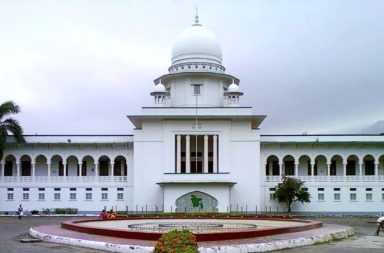By Shyikh Mahdi
It was a surprising moment for the Bangladeshi music fans, when the famous song Phiriye Dao (ফিরিয়ে দাও – Give me back my love) had been copied in the soundtrack of the 2004 Bollywood block-buster movie, Murder.
The appalled fans immediately brought the issue before Manam Ahmed, Hamin Ahmed and other members of Miles. Apart from the language (which was, of course Hindi), the similarity of the two songs in terms of tune and composition was really shocking.
“It’s daylight robbery in Murder, screamed a cult Bangladeshi rock band – and its plea has been heard”
– The Calcutta Telegraph, 20 May 2004
Miles, one of the most popular bands of Bangladesh, composed the song Phiriye Dao (ফিরিয়ে দাও) in 1993. It was released in the album Prathasa (Hope). It was a huge hit, and subsequently made its place in the album ‘Best of Miles, Vol. 1’ released in 1997 by the Asha Audio Co. of Calcutta. This release spread the popularity of the song beyond borders, and it gained huge fame in both the parts of Bangla – Bangladesh and West Bengal, India.
The legal battle: Rock n’ Roll case
Upon consultation with the lawyers and concerned official from both the countries, Miles decided to take the issue for a legal battle. It was decided that the band would seek redress for the violation of their IP rights protected under various treaties of the Intellectual Property Law, most notably the Berne Convention, Rome Convention and the TRIPS (Trade-related aspect of IP) Agreement.

Mahesh Bhatt and Anu Malik
On 17 May 2004, a writ petition was filed by Mr. Pratap Chatarjee, an lawyer from Calcutta in the Calcutta High Court against the producer of the movie Mahesh Bhat, the music director Anu Malik, the singer of the song, Amir Jamal, the recording firm Saregama (India) Ltd and the audio company RPG Global Music (London). The petition claimed that the defendants had collaborated on copying the song Phiriye Dao in the soundtrack Jana Jane Jana of the movie Murder. It was further claimed that the themes of the two songs were similar and their melodies, even the chords were identical. A compensation of 50 million rupees was sought from the defendants, along with total reimbursement from the movie revenue.
Aftermath
In terms of rule-based international trade law and cross-border protection of intellectual property law, this was indeed a triumph for the music industry of Bangladesh. Although the problem (and the possibility of future exploitation) persists for some compelling reasons. A comprehensive review study was conducted on the case (famously coining the name ‘Rock n’ Roll case‘) which was later included in the selected Case Study collection of WIPO, and till that time the band had won only the first round of the legal battle, and had yet to secure a verdict on the nature and amount of monetary compensation for the damage caused to their business prospects.
Nevertheless, this ground breaking verdict served as a warning to would-be violators of IP rights especially in the realm of music and arts, at the same time it encouraged creative people all over the world by reassuring them that their creative works can be defended against piracy. Although very recently, a famous Bangladeshi singer Asif has brought similar allegation against acclaimed composer A. R. Rahman, (reported by Dhaka Tribune), which actually proved to be a hoax.
Shyikh Mahdi is a trainee lawyer and a blogger; he can be reached at mahdi@futrelaw.org



